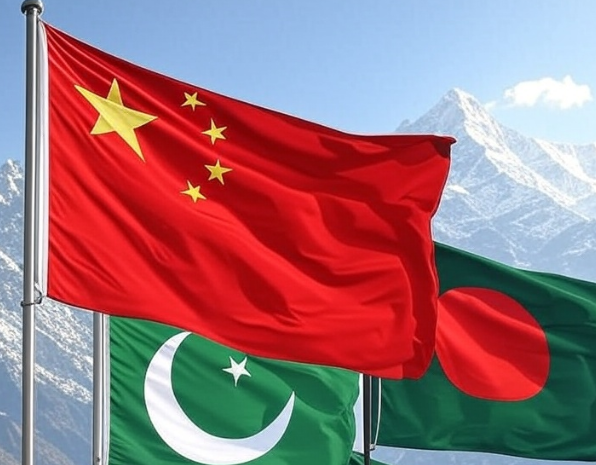Beijing Hosted Secretly Historic First Trilateral Meeting Between Bangladesh, China, and Pakistan:Beijing hosted the first-ever trilateral meeting between Bangladesh, China, and Pakistan, signaling a major shift in South Asian diplomacy. Held in Kunming, the meeting focused on deepening cooperation in trade, investment, digital economy, education, and more, while also marking a thaw in Bangladesh-Pakistan relations after years of diplomatic freeze. This historic engagement highlights China’s growing influence in the region through its Belt and Road Initiative.
Beijing Hosted Secretly Historic First Trilateral Meeting Between Bangladesh, China, and Pakistan
In a significant move that could reshape the geopolitical landscape of South Asia, Beijing hosted the first-ever trilateral meeting between Bangladesh, China, and Pakistan on June 19. The high-level diplomatic talks were held in the southwestern Chinese city of Kunming, marking a new chapter in regional diplomacy and multilateral cooperation.
The meeting was co-chaired by Chinese Vice Foreign Minister Sun Weidong, Bangladesh’s Acting Foreign Secretary Rahal Alam Siddiki, and Pakistan’s Foreign Secretary Amna Baloch, who participated virtually. The session brought together these three nations to discuss a broad range of cooperative initiatives, indicating China’s growing efforts to redefine regional partnerships and build alternative multilateral frameworks in South Asia.
During the meeting, the three countries expressed their commitment to deepening cooperation across multiple sectors, including trade and investment, the digital economy, education, and more. Beijing emphasized that both Bangladesh and Pakistan are important partners in its ambitious Belt and Road Initiative (BRI), signaling a push to further integrate these nations into China’s grand vision of economic connectivity and infrastructure development.
This trilateral dialogue is particularly significant against the backdrop of a gradual thaw in Bangladesh-Pakistan relations after more than 15 years of diplomatic freeze. Over the years, ties between the two countries had remained strained, largely due to historical grievances stemming from the events surrounding the 1971 Bangladesh Liberation War.
However, recent developments indicate a shift towards cautious engagement. This year alone has seen a flurry of rare bilateral interactions, including a high-profile Bangladeshi military visit to Pakistan and Bangladesh’s participation in a Pakistan-led naval exercise. These moves suggest that both nations are exploring avenues to gradually normalize relations.
According to the official statement from Pakistan’s Ministry of Foreign Affairs, the inaugural meeting of the Bangladesh-China-Pakistan Trilateral Mechanism was held in Kunming, Yunnan province of China. The meeting was attended by Chinese Vice Foreign Minister Sun Weidong, Bangladeshi Acting Foreign Secretary Ruhul Alam Siddique, and Additional Foreign Secretary of Pakistan Mr. Imran Ahmed Siddiqui. Pakistani Foreign Secretary Amna Baloch participated virtually in the first phase of the meeting.
In her remarks, Foreign Secretary Amna Baloch thanked the Chinese side for organizing the inaugural trilateral meeting. She noted the shared aspirations of the three sides for people-centric development and expressed Pakistan’s desire for deeper engagement between China and South Asian countries.
She also conveyed Pakistan’s satisfaction over the positive momentum in bilateral ties and reiterated Pakistan’s readiness to work closely with China and Bangladesh to enhance cooperation in trade, investment, agriculture, the digital economy, and other sectors.
For China, the trilateral format offers a strategic opportunity to strengthen its influence in South Asia at a time when regional dynamics are shifting. By bringing Bangladesh and Pakistan to the same table, Beijing is not only promoting its economic and diplomatic interests but also positioning itself as a central player in facilitating dialogue among its neighboring countries.
The trilateral meeting in Kunming could potentially pave the way for more such dialogues in the future, contributing to a more interconnected and cooperative regional order. As these nations continue to engage in such high-level talks, the outcomes could have far-reaching implications for regional stability, economic development, and the broader balance of power in South Asia.

